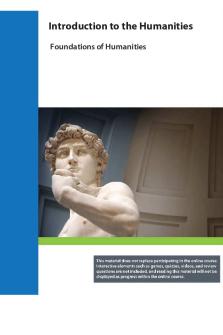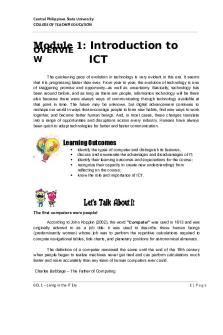Introduction to Humanities - Module 1 Course Work Notes PDF

| Title | Introduction to Humanities - Module 1 Course Work Notes |
|---|---|
| Author | Cathy Rakowski |
| Course | Introduction to Humanities |
| Institution | Western Governors University |
| Pages | 3 |
| File Size | 63.8 KB |
| File Type | |
| Total Downloads | 100 |
| Total Views | 129 |
Summary
Module 1 Course Work Notes from the entire chapter. Have more of the modules if your interested....
Description
Summary of Key Module Concepts What Are the Humanities? The word "humanities" is derived from the Latin term, humanitas, which essentially refers to humans and their culture. Thus to study the Humanities is to learn what it is to be human, not from a biological sense but a cultural sense. The study of Humanities seeks to understand what humans believe and why, along with what we have believed in the past and even what we might believe in the future. By studying the Humanities we can understand the past as more than just a series of events, but as a pattern of human interactions within a rich context of beliefs, ideals, and experiences. Doing so allows us to build better relationships, to better understand and thus communicate with one another, be it person-to-person or nation-to-nation. By taking measure of our past, and learning to appreciate it, we come to a better understanding of our own values as well as our biases. We can look at our own lives in context. Why Study the Humanities? What is the value of studying the Humanities in a university setting? A consideration of literature, art, music, dance, film and philosophy offers practical, social, and aesthetic benefits to students. Exploring the continuing questions addressed by men and women throughout the ages through the vehicle of the arts should deepen and enrich our current existence. Themes in the Humanities Themes are unifying ideas that are repeated or developed throughout a literary or artistic work. What you will see throughout this course is that there are themes that define a period, these themes anchor each creative work or sets of contexts addressed in the period. As you will see, there are three themes that affected not just a single period, but are powerful enough that they have, historically, required revisiting and re-imagining. These themes, individualism, revolution, and classicism, tell us something about the values central to the Western world. Some Recurring Universal Themes There are several recurring themes that exist across multiple disciplines within the Humanities, but no two feature more prominently than love and heroes. Love
The ancient Greeks developed the distinction between eros (erotic love) and agape (platonic love). Love also opened the Humanities to exploring other distinct forms of love that define our humanity: love of God, of family, romantic love, and friendship. As Western traditions for marriage have changed, so has the conception of love. When young adults were supposed to choose their own spouse and remain with them for life, romantic love was celebrated for its ability to endure and sustain. Heroes
The hero is an archetype found in virtually every culture and society because the "heart" of the hero's journey is fundamentally the same everywhere. The hero archetype satisfies a psychological need to see the individual (to see oneself) as capable of stupendous feats (physical, mental, or moral) against seemingly insurmountable and antagonistic forces. The archetype of the hero is alive today, taking form as (for example) an exalted political candidate, sports superstar, or glamorous pop culture celebrity. Central Concepts in Humanities Humanism can be defined as the study of the creative and intellectual contributions made by all cultures and as an ethical
Introduction to the Humanities Copyright 2021 MindEdge, Inc. All rights reserved. Duplication prohibited.
system that emphasizes human reason, values and the scientific method. Myths are traditional stories of a people or culture that serve to explain some natural phenomenon, the origin of humanity, or customs or religious rites. These myths often offer practical and spiritual wisdom in addition to providing entertainment. Beauty can be defined as those qualities that give pleasure to the senses. An aesthetic experience is an experience of beauty that inspires a feeling of pleasure that is its own justification. For example, the beauty of the moon may cause us to enjoy the experience of looking at the moon just for the sake of looking at it. Archetypes are age-old models by which we comprehend human experience. The concepts of heroes, scapegoats, and heaven are examples of concepts that have been passed down through generations and have become part of our cultural subconscious. Aesthetic experience is an experience of beauty that inspires a feeling of pleasure, which is its own justification, and this experience is valued independently of others. The Humanities and the Disciplines Music is an artistic form of auditory expression that incorporates instruments or human voices in a structured and continuous manner. Cinema is an artistic medium that uses the motion picture as a vehicle for storytelling and other creative expressions. The visual arts entail creation of primarily visual works, which can be two or three-dimensional. These include painting, illustration, photography, printmaking, and sculpture. Literature is an art form of the written word. It refers to an individual literary work or collectively to the creative writing of a people, nation, or culture. Major forms of literature include poetry, novels, plays, and short stories. Theater is a storytelling art. It often combines speech, music, gesture, dance, stagecraft, and spectacle to perform a drama or musical before a live audience. Dance is an art form involving a sequence of rhythmic movements or steps usually performed to music. Historically, dance has often served ritualistic as well as entertainment purposes. Architecture is the science and art of designing buildings and other structures and is concerned with the aesthetic effect of structures in their surrounding environment. Philosophy is the systematic investigation of fundamental questions concerning such matters as existence, reality, consciousness, knowledge, truth, and justice. The main branches of philosophy are metaphysics, epistemology, ethics, aesthetics, logic, and the philosophy of the mind. Some Functions of Art What art achieves is its function. There are five broad functions of art: Art provides aesthetic pleasure. Art offers political and social commentary. Art can assist in physical and emotional healing. Art can create historical artifacts from a specific time or place. Art can be used to enable commerce in advertising products and services. Most often, a single artwork can have multiple functions and, over time, the functions of a single work can increase. Humanities and Global Exchange Western civilization is generally associated with humanism and the humanist tradition, but humanism was never an intellectual heritage or pattern exclusive to the West. History instructs us that a humanist tradition also emerged in the nonwestern world. Throughout history, traditions and innovations from the East and West have intertwined. Cultural exchange has occurred since at least the beginning of recorded history and continues to this day across the globe. The cultural exchanges highlighted throughout this course reflect the end products of the exchange but do not necessarily discuss how that exchange was made possible. You can, therefore, choose to look beyond the pages here and learn more about why these exchanges occurred (and continue to occur) and how cultural exchange may impact the items and images with which you interact every day. Humanities and Professional Life In his groundbreaking book, Consilience: The Unity of Knowledge biologist E. O. Wilson defined "consilience" as a "jumping together" of knowledge by the linking of facts and fact-based theory across disciplines to create a common groundwork of explanation.
Introduction to the Humanities Copyright 2021 MindEdge, Inc. All rights reserved. Duplication prohibited.
These ideas are still being explored today for their powerful contribution to the world of Humanities study in universities and colleges around the world. At WGU, you will be able to apply Wilson's core principle and the study of Humanities to the following fields: Teacher's College College of Information Technology College of Business College of Health Professions
Introduction to the Humanities Copyright 2021 MindEdge, Inc. All rights reserved. Duplication prohibited....
Similar Free PDFs

Introduction to Social Work
- 9 Pages

Module 1 -Introduction to Research
- 15 Pages

Module 1 Introduction To Mechanics
- 11 Pages
Popular Institutions
- Tinajero National High School - Annex
- Politeknik Caltex Riau
- Yokohama City University
- SGT University
- University of Al-Qadisiyah
- Divine Word College of Vigan
- Techniek College Rotterdam
- Universidade de Santiago
- Universiti Teknologi MARA Cawangan Johor Kampus Pasir Gudang
- Poltekkes Kemenkes Yogyakarta
- Baguio City National High School
- Colegio san marcos
- preparatoria uno
- Centro de Bachillerato Tecnológico Industrial y de Servicios No. 107
- Dalian Maritime University
- Quang Trung Secondary School
- Colegio Tecnológico en Informática
- Corporación Regional de Educación Superior
- Grupo CEDVA
- Dar Al Uloom University
- Centro de Estudios Preuniversitarios de la Universidad Nacional de Ingeniería
- 上智大学
- Aakash International School, Nuna Majara
- San Felipe Neri Catholic School
- Kang Chiao International School - New Taipei City
- Misamis Occidental National High School
- Institución Educativa Escuela Normal Juan Ladrilleros
- Kolehiyo ng Pantukan
- Batanes State College
- Instituto Continental
- Sekolah Menengah Kejuruan Kesehatan Kaltara (Tarakan)
- Colegio de La Inmaculada Concepcion - Cebu












